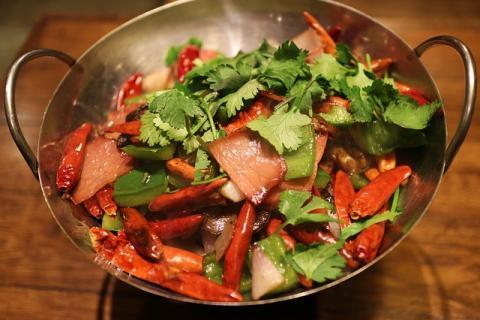
Spicy foods get a bad rap because they can be harsh on people with sensitive stomachs. We all have different palettes, and many people have been exposed to dishes that have used spices in excess. It’s also true that people who have ulcers or hemorrhoids may experience discomfort when eating spicy food, but for almost everyone else, spicy foods carry many benefits. Here are a few benefits of spicy foods to keep in mind:
Decreases inflammation. Research states that many spicy foods carry anti-inflammatory properties. Inflammation contributes to symptoms of arthritis, problems in the stomach such as ulcers, and even heart disease. Inflammation is usually a result of the way the body’s immune system fights off infections. Excess inflammation occurs when an infection leaves the body, but excess swelling stays. Spicy foods help prevent this problem. If you’ve ever had a cold, you can find that a cup of ginger tea will help get the mucus out of your body and help you breathe better – this is just one example of spicy foods decreasing inflammation.
Increases serotonin. More research is needed in order to claim spicy foods help fight depression. However, current research has shown that eating spicy foods increases serotonin. An increase in this hormone also helps fight stress.
Cools the body. Spices can be added to cold dishes and enjoyed during the summer. If you think about dishes eaten in India, Mexico and Thailand, you’ll notice that these countries are generally warm. The heat in spicy foods could actually induce sweating and help your body cool down.
Decreases blood pressure. Many chilies include vitamins A and C, which help boost cardiovascular health.
May combat cancer. Capsaicin, found in peppers, has shown it can decrease the size of prostate cancer cells. More research is needed to fully prescribe these as a cancer treatment, but adding spicy foods to your diet can’t hurt.
Keeps your sinuses clear. It’s common to experience a runny nose after eating spicy food. This is because capsaicin irritates your tissues as it touches them. As such, adding a bit of heat to your food when you have a cold, flu, or sinus infection may help you breathe better.
How to Incorporate Spicy Foods Into Your Diet
Choosing spices is almost like choosing wine—each has its own specific properties and can go well with certain foods. If you’re unsure about where to start, you can try dishes at restaurants that represent cultures that have been using spices as a main ingredient.
There are also other mild spices that have a positive effect on your health. Indian culture is known for its many curries and use of turmeric. Turmeric contains many antioxidants that have shown promise in anti-cancer research. Plenty of curries and delicious dishes in Indian culture use this as a main ingredient.
Mexican and Thai foods also famously incorporate spices into their meals, such as jalapeños. You can always ask for a sauce on the side so you can adjust the taste as you see fit. Some restaurants even allow you to choose your level of spice so that you can be more comfortable as you eat.








